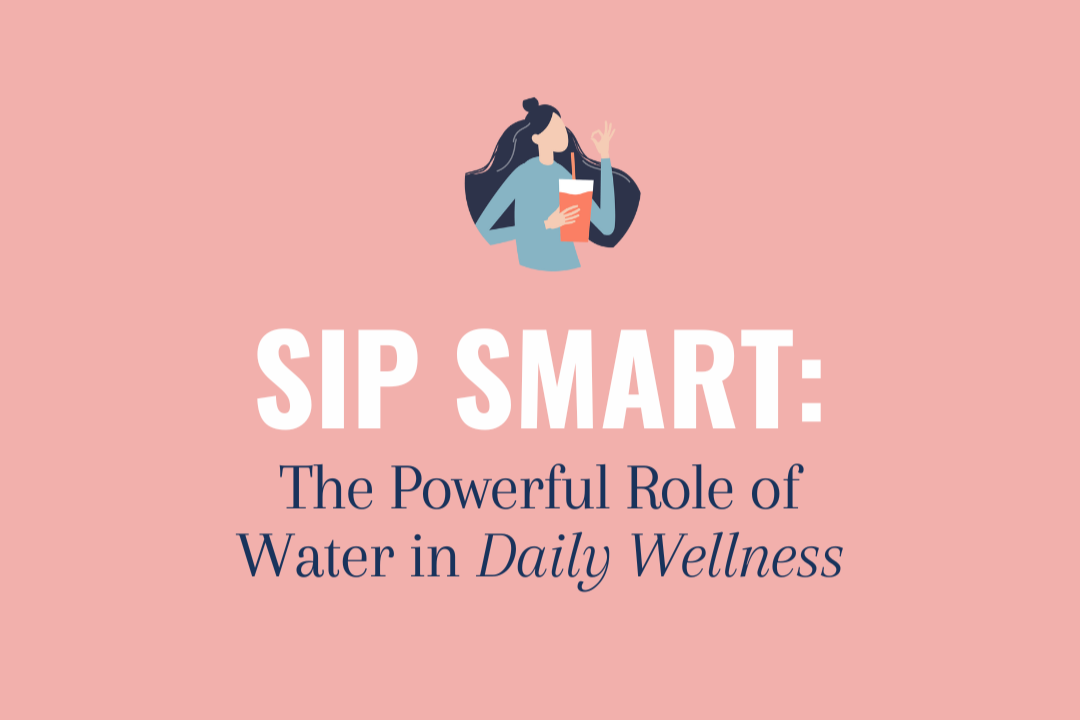Sip Smart: The Powerful Role of Water in Daily Wellness
It’s easy to overlook the power of something as simple as water. We drink it without thinking, or sometimes…let’s be honest, we don’t drink enough of it at all. But hydration plays a massive role in how we feel and function each day. If you've ever ended a long day wondering why you're so sluggish, headachy, or cranky, your water intake might be the culprit.
Let’s break it down: here’s why staying hydrated should be high on your wellness priority list and how to make it easier to do.
Why Hydration Matters So Much
Water is not just something we drink to quench thirst. It’s involved in almost every major system in your body. When you're properly hydrated, you're setting your body up to perform optimally from head to toe.
Here’s what water does for you:
Regulates body temperature
Lubricates joints
Transports nutrients and oxygen to cells
Helps remove waste through urine, sweat, and bowel movements
Supports healthy digestion and metabolism
Improves energy, focus, and mood
Keeps your skin looking fresh and elastic
On the flip side, not getting enough water can quickly throw things off. Dehydration can cause:
Headaches and brain fog
Fatigue or sluggishness
Digestive issues like constipation
Poor physical and mental performance
Dry, dull skin and dark under-eye circles
Increased risk for UTIs or kidney stones
In extreme cases, dehydration isn’t just uncomfortable, it can be dangerous.
How Much Water Do You Really Need?
Good news: it’s not as complicated as you might think.
According to the Dietary Reference Intake (DRI), here’s a general guide:
Men: About 3.7 liters/day (~125 oz or ~15.5 cups)
Women: About 2.7 liters/day (~91 oz or ~11.5 cups)
About 20–30% of that comes from the food you eat, but the rest should come from beverages—and preferably, plain ol’ water.
Remember: individual needs vary depending on your activity level, how much you sweat, and any health conditions you may have. Listen to your body and adjust as needed.
Water + Workouts: What to Know
If you're moving your body, you're losing water, especially through sweat and breath. That means your hydration needs increase when you're exercising.
Here’s a simple rule of thumb:
Add 12–24 oz of water for every 30–60 minutes of moderate exercise.
In hot or humid weather, or during intense workouts, you might need more, including replenishing electrolytes (like sodium, potassium, and magnesium).
Pro tip: Weigh yourself before and after exercise. For every pound lost, drink 16–24 oz of water to rehydrate properly.
BONUS: Foods with fluids!
Did you know you can hydrate by eating? Some fruits, vegetables, and other foods are water-packed and help boost your hydration levels while delivering extra nutrients and fiber.
Some water-rich all-stars:
Veggies: cucumbers, lettuce, spinach, tomatoes, zucchini, celery, mushrooms, peppers
Fruits: watermelon, strawberries, peaches, oranges, grapefruit, grapes, apples
Other hydrating foods: yogurt, cottage cheese, soups, oatmeal, smoothies
Easy ways to sneak more in:
Add a side salad to your meals
Snack on fresh fruit or veggie sticks with hummus or nut butter
Make a smoothie with yogurt and frozen fruit
Stir diced veggies into soups or whole grains
Flavor your water naturally with fruit or herbs (hello, cucumber-mint refreshment!)
How to Know If You’re Hydrated
Staying on top of hydration doesn’t have to be guesswork. Your body gives clues!
Signs you’re drinking enough water:
Pale yellow urine (not too dark!)
You’re peeing every 2–4 hours
Energy stays steady throughout the day
You’re thinking clearly
You’re not constantly thirsty
5 Simple Hydration Habits to Start Today
If you struggle to stay consistent, try these easy tips:
Start your day with a big glass of water before coffee, emails, or anything else.
Keep a reusable water bottle nearby at all times. (Desk, car, bag—wherever you are.)
Set reminders to take a sip every hour if you forget.
Make it fun by flavoring your water naturally (think citrus slices, berries, or mint).
Eat your water with hydrating meals and snacks throughout the day.
Bottom Line: Small Sips Add Up
Hydration doesn’t have to be overwhelming. You don’t need to chug gallons at once. Start by being more mindful of your water intake and how you feel throughout the day. A few intentional sips here and there can make a big difference.
So go ahead and fill that glass, slice up some citrus, and toast to taking care of yourself in the simplest way possible.
Want to feel your best? Stay hydrated. Your body will thank you.

